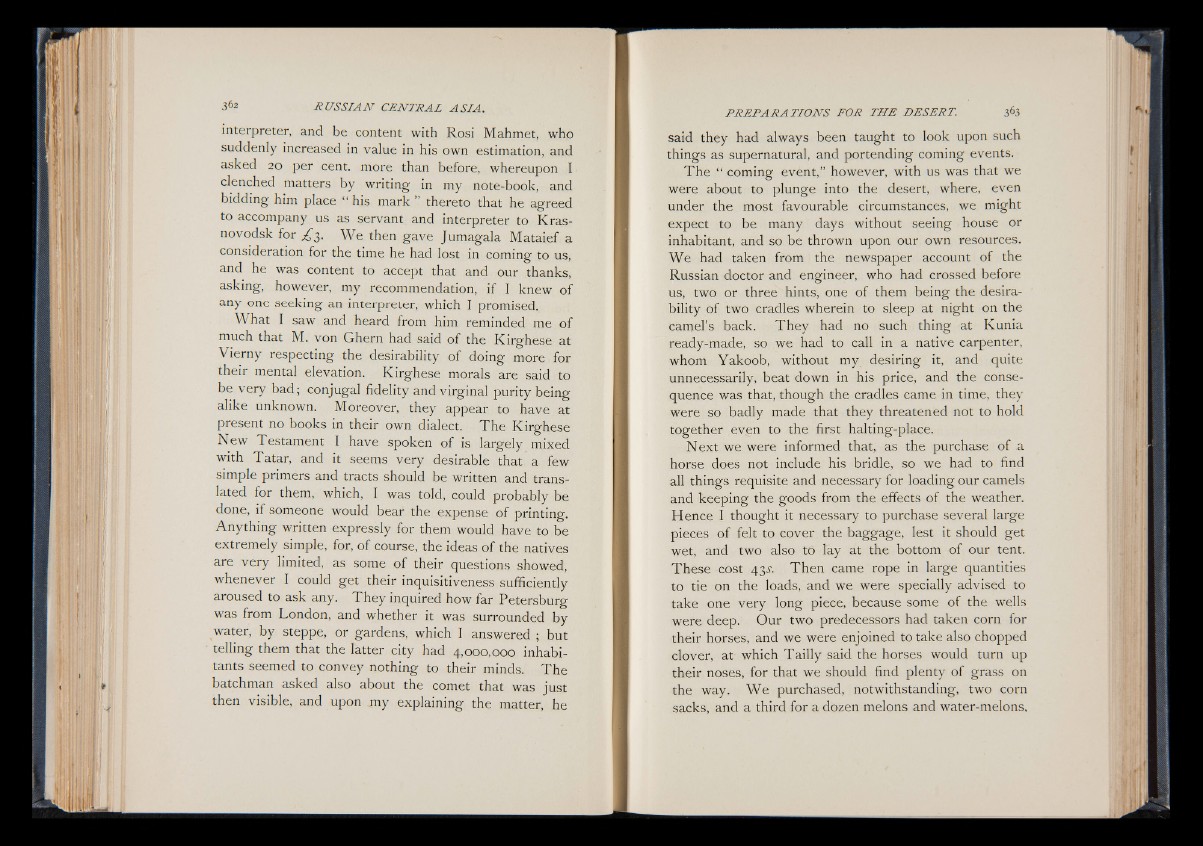
interpreter, and be content with Rosi Mahmet, who
suddenly increased in value in his own estimation, and
asked 20 per cent, more than before, whereupon I
clenched matters by writing in my note-book, and
bidding him place “ his mark ” thereto that he agreed
to accompany us as servant and interpreter to Kras-
novodsk for ^3. We then gave Jumagala Mataief a
consideration for the time he had lost in coming to us,
and he was content to accept that and our thanks,
asking, however, my recommendation, if I knew of
any one seeking an interpreter, which I promised.
What I saw and heard from him reminded me of
much that M. von Ghern had said o f the Kirghese at
Vierny respecting the desirability of doing more for
their mental elevation. Kirghese morals are said to
be very bad; conjugal fidelity and virginal purity being
alike unknown. Moreover, they appear to have at
present no books in their own dialect. The Kirghese
New Testament I have spoken of is largely mixed
with Tatar, and it seems very desirable that a few
simple primers and tracts should be written and translated
for them, which, I was told, could probably be
done, if someone would bear the expense of printing.
Anything written expressly for them would have to be
extremely simple, for, of course, the ideas of the natives
are very limited, as some of their questions showed,
whenever I could get their inquisitiveness sufficiently
aroused to ask any. They inquired how far Petersburg
was from London, and whether it was surrounded by
water, by steppe, or gardens, which I answered ; but
telling them that the latter city had 4,000,000 inhabitants
seemed to convey nothing to their minds. The
batchman asked also about the comet that was just
then visible, and upon my explaining the matter, he
said they had always been taught to look upon such
things as supernatural, and portending coming events.
T he “ coming event,” however, with us was that we
were about to plunge into the desert, where, even
under the most favourable circumstances, we might
expect to be many days without seeing house or
inhabitant, and so be thrown upon our own resources.
We had taken from the newspaper account of the
Russian doctor and engineer, who had crossed before
us, two or three hints, one of them being the desirability
of two cradles wherein to sleep at night on the
camel’s back. T h e y had no such thing at Kunia
ready-made, so we had to call in a native carpenter,
whom Yakoob, without my desiring it, and quite
unnecessarily, beat down in his price, and the consequence
was that, though the cradles came in time, they
were so badly made that they threatened not to hold
together ev^n to the first halting-place.
Next we were informed that, as the purchase of a
horse does not include his bridle, so we had to find
all things requisite and necessary for loading our camels
and keeping the goods from the effects of the weather.
Hence I thought it necessary to purchase several large
pieces of felt to cover the baggage, lest it should get
wet, and two also to lay at the bottom of our tent.
These cost 43^. Then came rope in large quantities
to tie on the loads, and we were specially advised to
take one very long piece, because some of the wells
were deep. Our two predecessors had taken corn for
their horses, and we were enjoined to take also chopped
clover, at which Tailly said the horses would turn up
their noses, for that we should find plenty of grass on
the way. W e purchased, notwithstanding, two corn
sacks, and a third for a dozen melons and water-melons.